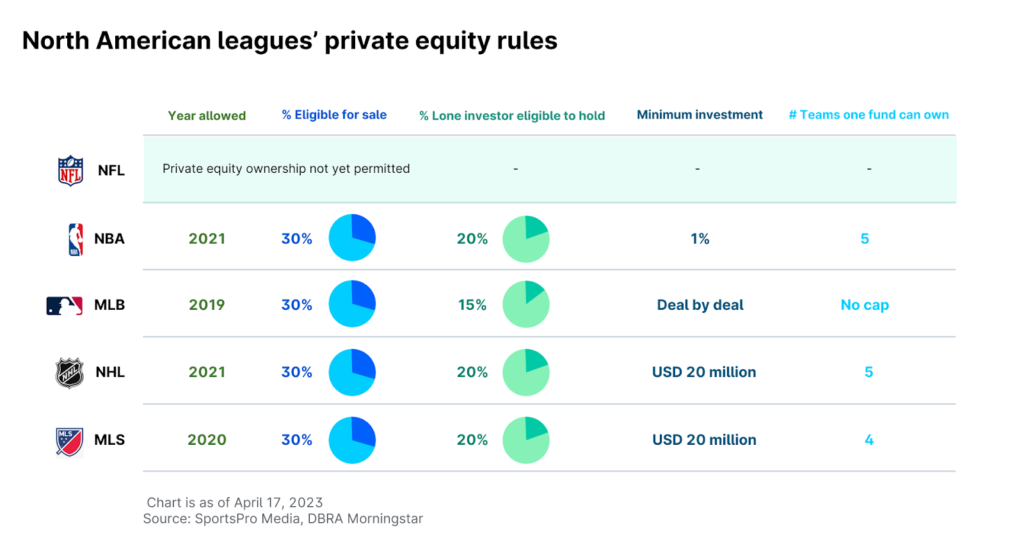Sports ownership is an alternative asset that’s reserved for the world’s wealthiest, a lot of which have been families or individuals.
Thought recently private equity has made its entrance into the space.
For the longest time, major sports leagues didn’t welcome institutional investors.
But with exploding valuations and monetary struggles derived from the pandemic, many leagues have begun to embrace it.
According to Pitchbook, since 2019 there have been at least 20 private equity investments in major league sports teams.
This compares to just six private equity sports deals from 2016 to 2019.
Firms such as Redbird Capital, Arctos Partners, Ares Management, and Dyal Capital Partners have deployed an exorbitant amount of capital into sports teams in recent years.
We’ve also seen international investors such as Qatar Sports Investments (QSI) and Saudi Arabia’s Public Investment Fund (PIF) enter the picture as well.
And it’s likely we’ll see more of this for these reasons…
Here Are 6 Reasons Why Private Equity Has An Interest In Sports
Sports teams are the ultimate media companies
Sports broadcasting rights are highly coveted and expensive.
Why?
Fans are highly invested in their teams, and live sporting moments are invaluable.
Ultimately, sports are the most important form of programming and the only thing that generates significant audiences on a reliable basis.
It’s the one live televised event that can bring large groups of people together at once.
Check this out…
Out of the most-watched primetime telecasts in 2023, 56 slots went to sports:
- 45 NFL games
- 6 NBA Finals
- 3 NCAA Basketball March Madness
- 1 for college football
- 1 Fox’s “The OT” NFL postgame show
And all of the top 10 were sports.
In US history, 22 of the 30 most watched television programs ever are Super Bowls (the 2023 NFL championship game is No. 2, just behind the moon landing).
Streaming services are also starting to look for sports programming to add to scripted programming.
Because of this, you’ve got an increase in demand against a relatively fixed supply.
So no matter how or where fans watch, sports teams will always demand multi-billion contract bids which increase investment appeal.
Sports ownership is a real estate play
Ted Leonis, owner of Monumental Sports which includes teams such as the Washington Wizards and Washington Capitals, recently announced plans to move the teams to Northern Virginia and build a 17-acre, $2 billion sports & entertainment complex.
David Adelman, Josh Harris, and David Blitzer, co-owners of the 76ers and New Jersey Devils, are moving the teams from South Philadelphia to Market East with plans to build their own $1.3 billion arena.
Steve Ballmer, owner of the Los Angeles Clippers is moving the team from a shared arena downtown to a brand-new Intuit Dome in Inglewood, California.
Almost every single NBA team’s arena is located in or in proximity to its city’s downtown.
Although most major league sports owners don’t outright own their stadium or arena at the moment, I believe that this will start to become more prominent over time.
Why?
Because owning a sports team isn’t just about media and entertainment.
It’s just as much of a real estate play.
And real estate is great for three reasons:
- Tax incentives
- Additional value
- Control
Sports teams have diversified revenue streams
Broadcasting and media rights are the single greatest revenue driver for virtually every major professional sports league globally, but it isn’t the sole revenue stream.
They also can make money through:
- Ticket sales
- Concessions
- Merchandise
- Sponsorships
- Licensing deals
- Parking fees
What’s next?
Virtual experiences, esports, and sports betting are other revenue streams that might also prove to be huge drivers over the next several years.
One of the main objectives of private equity firms is to take controlling stakes to improve the businesses and make them more profitable.
Teams not being reliant on any one revenue stream can mitigate risks, provide financial stability, and encourage growth long-term giving investors a better return.
Sports teams are less prone to recession
2020 happened and everything in the world stopped immediately.
Multiple companies went bankrupt.
Stocks plummeted.
Sports teams lost tons of money, but not a single major league team went out of business despite not having their main product on display.
Estimated COVID-19 Revenue Loss Due To No Attendance
- NFL: $4 billion
- NBA: $1.5 billion
- MLB: $3 billion
- Premier League: $2.5 billion
If you take a look at the chart below, sports franchise valuations have outpaced the S&P 500 over the last 20 years or so.
Despite economic downturns (08 crash, 2020 pandemic), the one thing that has always remained is sports.
While not necessarily recession-proof, sports teams and leagues have proven to be recession-resilient.
Fans have an unbreakable emotional tie to their favorite teams and athletes.
Regardless of how the economy is doing – people have needed entertainment in some capacity.
This means sports will always have a place in society.
Sports teams are scarce and limited
There are a total of 153 Major League sports franchises (MLB, NHL, NFL, NBA & MLS) in North America, that are spread across 52 cities in the United States and Canada.
If you throw the WNBA in the mix, there are only 165 of these assets in circulation.
Unlike the markets for real estate or tech companies (for which there are thousands in circulation or that can be created), when it comes to sports teams, demand vastly exceeds supply.
Because of this buyers and investors have recently started looking at new emerging leagues such as:
- Athletes Unlimited
- United Soccer League
- Big3
- LIV Golf
- American Cornhole League
- TGL League
- League One Volleyball
- Major League Pickleball
- National Cycling League
- United States Football League
- Premier League Lacrosse
- National Women’s Soccer League
- Pro Volleyball Federation
These leagues can present a bigger upside because of their novelty and entry price.
But with there being a limited amount of teams available in general, demand for ownership will likely continue to increase.
In turn, this will make valuations rise providing better potential returns in the long run.
Sports ownership is about status and visibility
Aside from the monetary benefits and returns, sports are about perception and status.
When you buy a team – you essentially buy visibility.
They say that any billionaire can buy a plane, mansion, or yacht.
The real prize now is owning something that most billionaires can’t get: A sports team.
And to do this it’s not enough to have money.
You also need solid relationships and connections to make it happen.
That’s a level of status that many aspire to have.

What does all of this mean?
Private equity can introduce a more global reach, improve operations and athletic performance, and provide capital infusion for growth, among other things.
In the same instance, it can taint the overall fan experience and negatively impact the team and corporate culture.
Whether its entrance into sports is a good or bad thing is to be determined.
I do believe it’s way too nuanced and complicated to say at the moment.
Nonetheless, what we do know for now is that it’s here and it’s happening.
Regardless of how fans, players, and other constituents might feel, private equity will continue to rear its head into sports in the short term.

